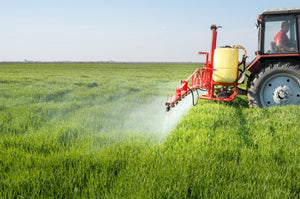Organic Farming and Pesticides
April 18, 2016

The biggest growing sector of the food market by far is organic food, and while for many years it was considered a lifestyle choice of just a small group of consumers, it has now proven to be a mainstream lifestyle choice.
Organic foods like produce, meat and dairy that used to be only available in health food stores or farmers’ markets, are now sold in most retail chain supermarkets. However, while there are numerous reasons to eat organic foods, organic farming does introduce some new concerns too.
The Truth about Organic Pesticides
Many of us think that organic food is grown without using chemicals or pesticides, but the reality is organic farmers can use a wide variety of chemical sprays and powders on their crops, as long as the pesticides they use are derived from natural sources. Also, any equipment used to apply the pesticides must not have been used to apply synthetic pesticides for the past three years, nor can the land being planted have been treated with any synthetic materials for the same timeframe.
Carcinogenics
One of the reasons that most of us stay away from synthetic pesticides is their ability to cause cancer. In fact, fifty percent of synthetic pesticides are carcinogenic. But does it mean to say that foods grown naturally pose no risk? Not so, and it wasn’t until just recently that natural chemicals were tested to see if they posed any risk. What was surprising is that even the natural pesticides that were tested were shown to be carcinogenic too. We recently participated in research about Organic Farming and Pesticides and we too were surprised at what is permitted. You can read more here.
Is Less, More?
From our research, we discovered that there is a big difference in how many applications of natural pesticides need to be applied to crops versus how many synthetic chemical pesticides applications are needed. One recent study revealed that 7 applications of natural pesticides were needed, compared to only 2 applications of synthetic pesticides. Simply put, the natural pesticides are less effective, so they need to use much more – three times more in fact!
It Still Needs Washing
The important message here is that you need to be just as careful with organic as you do with inorganic foods. Simply because the product is organic doesn’t mean you don’t need to wash it – and that especially applies to produce.
In fact, there may be even more of a need to wash organic produce than conventionally farmed produce because, in addition to the use of organic pesticide use, organic produce may have a higher bacterial load than that found on produce treated with synthetic pesticides. This means that you shouldn’t just dunk it under water and be done with it. Instead, hold it under flowing water and rub the outer skin to remove as much residue as possible. Better still, peel or scrub soft fruits like peaches or plums, etcetera.
Some pesticides can stick to waxy fruits like apples and other soft-skinned fruits. Some of the pesticide can even get trapped underneath the wax. In those cases, you may need to use a vegetable peeler to reduce pesticide traces. For more information about pesticides in your produce, the Environmental Working Group, a non-profit, non-partisan organization has put together a very informative guide, and you can also sign up with them to get a PDF version copy of their guide. If you’ve seen this guide before, you may be excited to learn that it was just updated. Many people will be surprised to see strawberries and apples top their “dirty dozen” list. Also, check out these resources to learn more about pesticide residues and fruit and vegetable handling practices, learning how to properly wash fruits and vegetables can help help reduce your exposure to both natural and synthetic pesticide residues.
Growing Your Own
If you want to completely avoid pesticides, consider growing your own fruits and veggies, and if you’ve never done this before, they’ll be the best tasting produce you’ll ever eat. This is a project that’s fun to do with the kids too.
If your kids are fussy about eating veggies, letting them grow their own little patch may change their minds very quickly, once they see the fruits of their own labor. It’s also a great idea to talk with your friends and neighbors and create a neighborhood garden co-op. It’s a perfect way to add variety, especially if you don’t have a lot of room in your yard.
The next best thing to growing your own is a visit to your local Farmers’ Market. You can even talk to the growers and ask them about their pest management. They’ll be happy to talk to you. Not to mention, since it’s spring, there’s an abundance of produce this time of the year.
The post Organic Farming and Pesticides appeared first on Natren Probiotics Blog.





Leave a comment